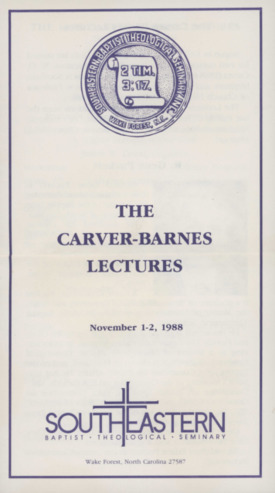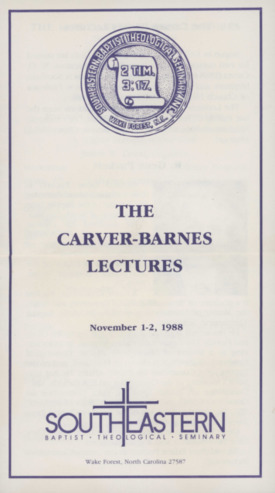Search Constraints
« Previous |
1 - 20 of 3,189
|
Next »
Search Results

- Description:
- Richard Gene Puckett was the editor of the Biblical Recorder. Puckett is announced as Chapel speaker (0:00-0:12). A hymn is played (0:13-4:51). A word of prayer is followed by a hymn (cut) (4:52-6:05). Puckett is introduced (6:06-8:02). Puckett thanks Southeastern’s students and faculty (8:03-9:03). His lecture, “State Baptist Papers: Reflectors of the Crises,” focuses on how printed papers are better records of current events (9:04-10:00). He summarizes his lecture from the day before: he explains that the lecture dealt with the history of U.S. Baptist missions with a specific focus on the Judsons and Luther Rice and the creation of the Triennial Convention, the Southern Baptist Convention, and state conventions (10:01-10:20). Puckett expresses that documents exist that inform us of what truly happened during the birth of Baptist missions and that Baptist papers mirror these events (10:21-11:39). He chooses ten crises to prove this point, with the first crisis being the mission vs. anti-mission movements of the nineteenth century (11:40-11:59). These movements resulted due to the conflict between general atonement (Arminian theology) and particular atonement (Calvinistic theology) (12:00-12:55). Puckett reveals that Baptist papers reflected this conflict in Maryland (12:56-15:49). The second crisis involved the founding of the Southern Baptist Convention by the Virginia Mission Society which became a large highlight in Baptist papers (15:50-16:24). The third crisis is the Campbellite and Landmark movements, with the former movement involving Alexander Campbell and his view on baptism (16:25-17:15). Biblical Recorder editor Thomas Meredith recorded the errors of this movement (17:16-18:58). Puckett then explains that the Landmark movement viewed its church as the only valid church in accordance with New Testament truth and made an appearances in the Tennessee Baptist Paper and the Kentucky Western Baptist Review (18:59-20:48). The fourth crisis, with which the Kentucky Western Recorder highly involved, was the Witsitt controversy over whether Baptists could be traced back to Jesus’ time (20:49-23:45). Fundamentalism vs. Modernism was the fifth crisis that became popular in Baptist publications, specifically the Oklahoma Baptist Messenger (23:46-27:33). Puckett’s sixth crisis is the Baptist westward movement: some believed that these Baptists were not true Baptists with Reuben Ally, editor of the Virginia Religious Herald, being a strong voice of the conflict (27:34-29:11). Crisis seven is the Southern Baptist Seminary conflict that occurred due to a disagreement between the president and faculty and appeared in multiple papers such as the Kentucky Western Recorder and the Christian Index (29:12-33:16). The Elliot controversy at Mid-Western Seminary also found its way in Baptist papers, with E.S. James, editor of the Texas Baptist Standard leading the way (33:17-36:02). Puckett’s ninth crisis is the struggle of power, especially within the Southern Baptist Convention concerning the presidential position, and he conveys that this crisis caused many papers to suffer as they attempted to record the facts (36:03-38:23). The final crisis is one that occurred at Southeastern and was accurately and completely recorded by the Biblical Recorder (38:24-40:14). Puckett speaks on the problems of editing and recording, focusing on how writers never have complete freedom of words and on how they must strive to record truthfully, yet fairly (40:15-50:54). He then closes with saying that the Baptist mission of the world depends on education and information (52:59-53:59). Puckett is thanked and the congregation is informed that he will be in the Ledford Center for further discussions (52:59-53:59). A word of prayer ends the event (54:00-54:23).
- Subject:
- Christian education, Baptist associations, and Church controversies--Southern Baptist Convention
- Creator:
- Puckett, Richard Gene and Southeastern Baptist Theological Seminary
- Location:
- Wake Forest (N.C.)
- Language:
- English
- Date Created:
- November 2, 1988
- Resource type:
- Audio and Text
- Identifier:
- SEBTS_Carver-Barnes_Lecture_Richard_Gene_Puckett_1988-11-02

- Description:
- Richard Gene Puckett was the editor of the Biblical Recorder. Puckett is announced as Chapel speaker (0:00-0:08). A hymn is played (0:09-3:36). A word of prayer is followed by a hymn (cut) (3:37-5:28). The congregation is welcomed, and Puckett is introduced (5:29-10:10). Puckett begins with why he accepted to speak in chapel and offers a testimony (10:11-16:04). He speaks of the necessity of education in order for Baptists to effectively witness and conduct their ministry, with a focus on the birth of Baptist missions (16:05-16:40). He discusses the establishment of the Baptist Triennial Convention as well as the work of the Judsons and Luther Rice (16:41-31:40). Luther Rice’s model at the Columbian College in Washington D.C. led to the births of Baptist publications, conventions, and colleges that made up the foundation of the Southern Baptist Convention (31:41-34:40). Puckett highlights that Northern Baptists began taking over in the Triennial Convention and that a conflict over slavery issued (34:41-42:40). He then speaks of the NC Baptist Association and its founders: Thomas Meredith, editor of the Biblical Recorder, and Samuel Wait, the first president of Wake Forest College (42:41-46:41). He closes his lecture by expressing that conflicts still exist, yet God still remains and the Gospel continues to be preached (46:40-48:36). The announcement of Puckett’s second lecture is made and the congregation is informed that Puckett will be in the Ledford Center for further discussions (48:37-49:12). A word of prayer ends the event (49:13-49:34).
- Subject:
- Christian education, Missions, and Baptist associations
- Creator:
- Puckett, Richard Gene and Southeastern Baptist Theological Seminary
- Location:
- Wake Forest (N.C.)
- Language:
- English
- Date Created:
- November 1, 1988
- Resource type:
- Audio and Text
- Identifier:
- SEBTS_Carver-Barnes_Lecture_Richard_Gene_Puckett_1988-11-01
